A profile of Bill Gulick that originally appeared in the Spokane, Washington Spokesman-Review dated July 20, 1958. I’ve added a few excerpts from another article in the Tacoma, Washington News-Tribune dated June 26, 1948.
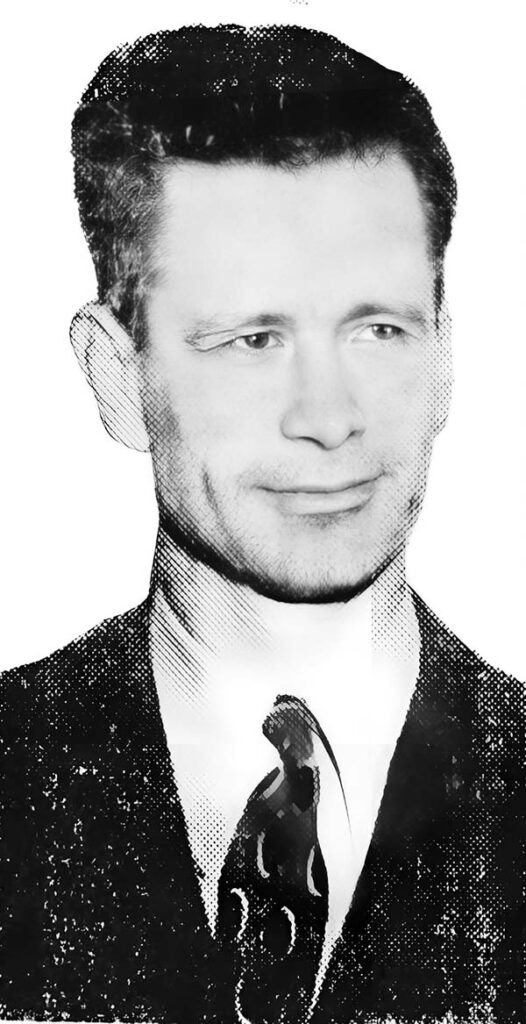
Gulick Brings Old West Alive
By Jay Kalez
IF BILL GULICK, Walla Walla’s prolific novelist and writer of Saturday Evening Post western short stories, should ever find himself in the harassed position of “an author in search of a character,” he might solve his predicament by merely studying his own mirror. Tall, lean, flat-fronted as a plank, broad-shouldered, square-jawed, and with an eye-twinkle that betrays a never dormant sense of humor, Gulick could pass as a stand-in for most any of his western novel or short story heroes.
And westerner he is. Born in 1916 in Kansas City, Mo., Gulick spent his “growing up” years in Oklahoma City. He attended the University of Oklahoma, and finishing college, went to work for the Oklahoma Gas and Electric company back in the boom days high-line construction era of the late ’30s.
“I’d tried some writing, but everything bounced right back. So I decided to take some college writing courses and see if I couldn’t make a living at it.” he explains.
Living in power-line construction camps, Gulick met up with some mighty tough and picturesque characters. Finally, for composition exercise and to keep himself aware that there was still such a thing as parlor English, he began transplanting some of these camp characters into high-line construction stories.
Did it Hard Way
He attended classes at the university for six months and then got a second hand typewriter and went, to work. “I started by selling to the pulp magazines, mostly stories about the west.” This, as fiction authorities will tell you, is the usual way up for most writers —the hard way.
The first four years, Gulick halfway admits, were the hard ones. He averaged about two sales for every 10 stories, and the checks were not large. Now his sales percentage is very good -over 80 per cent.
The composition exercises, put to editorial pasture, captivated various interested editors, and by 1940 Gulick was appearing regularly in the better pulp magazines such as Adventure, Argosy, Blue Book and issues of the Popular publication magazines.
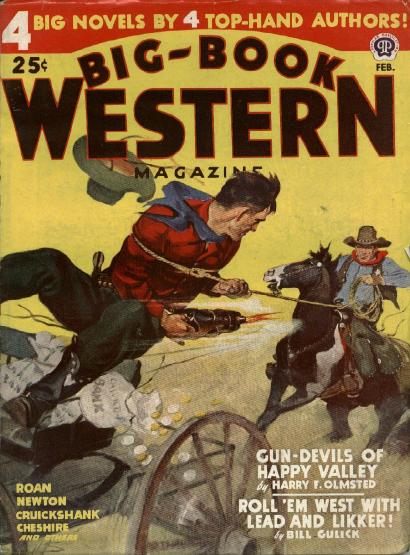
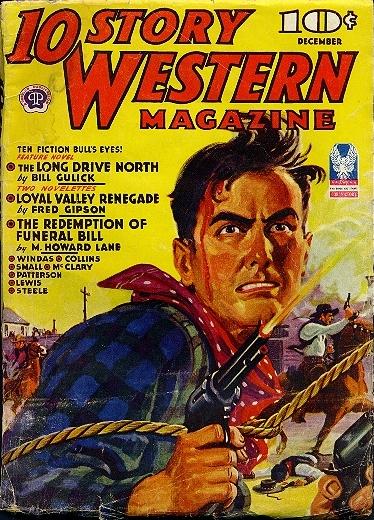
About this time Gulick also cracked the slick publications with a high-line story in the then weekly Liberty magazine. It was followed by short stories being accepted and appearing in other slick-paper magazines. until finally, in 1946, he reached the goal of all writers of popular short stories—a byline yarn in the Saturday Evening Post.
AS GULICK put it, in his slow, deliberate fashion of speaking that occasionally tripped over a guarded drawl, “About the time I began hitting the slick-paper magazines I began to feel like branching out. I was living in New York, and a slick- paper byline gives a writer prestige and plenty of free advice even in the Greenwich Village writers’ colony where I was doing my work.
“The slick-paper magazines were pretty generous with their short story checks, but some of my more experienced advisers pointed out a novel always has a chance of hitting the jackpot and building up a permanent endowment fund of royalties. I decided to do a novel and decided at the same time to come to the Pacific coast and absorb some realistic atmosphere for a western plot I had in mind. I began my travels, and in the next few months not only absorbed atmosphere, but absorbed, in addition, the responsibility of a wife and a promised honeymoon itinerary that called for a look-see back at my old Greenwich Village stamping grounds.
“By now I had abandoned my high-line construction camp stories and concentrated mostly on westerns. I had pretty well outlined my novel and decided on its title. I called it The Bend in the Snake and laid the setting in the locality of the Snake river country between old Fort Walla Walla and the gold-rush boom town of Lewiston in the 1860s.
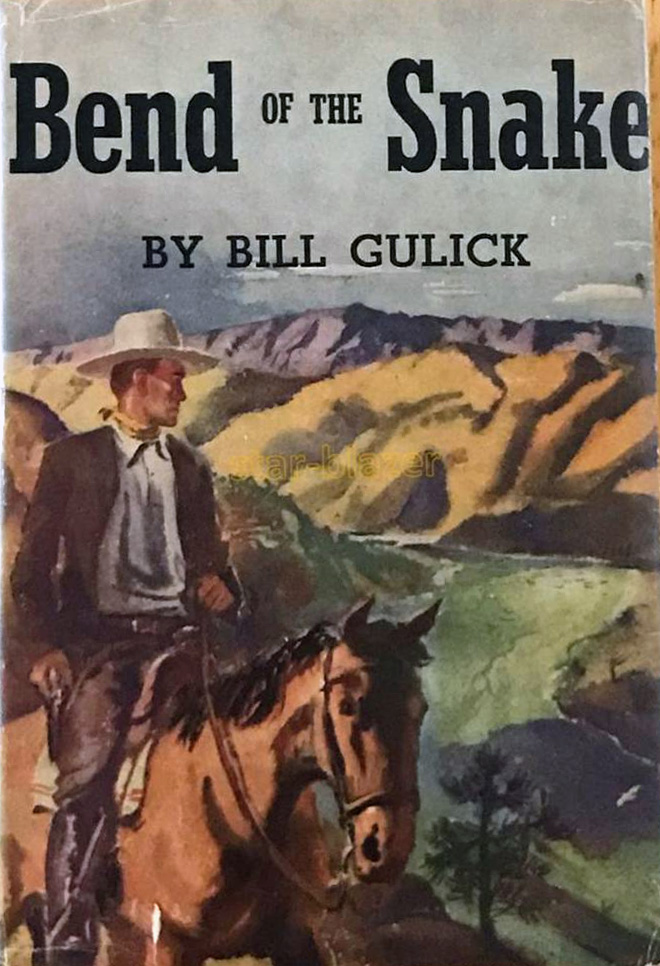
“During the writing of The Bend in the Snake my wife and I spent a considerable amount of time in the Walla Walla area, and the wealth of first-hand information on tap, with the abundant availability of old-timer anecdotes round town, made me decide that Walla Walla was an ideal place for a writer of western fiction to locate. Houghton Mifflin company came out with my first book in 1949 and Hollywood immediately optioned it for a movie. It was released in 1950 with James Stewart appearing in the leading role.
“Hollywood changed the book title to The Bend in the River and the movie was made with the stretch of the Columbia between Portland and The Dalles as the setting. The picture had its premiere in Portland and for a while the world couldn’t have been more rosy.’’
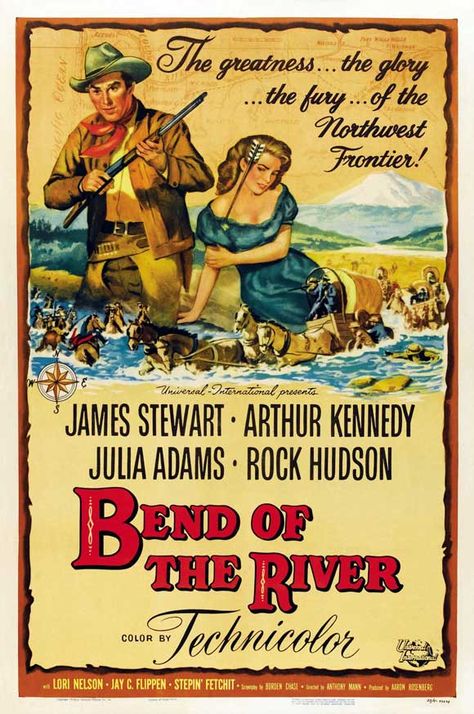
RIGHT about here a faraway look drifted across Bill Gulick’s face with his eyes reflecting a reminisence of happy days, good times, and no worries. Bend in the River was one of Hollywood’s pictures of the year and Gulick was not slighted in the film story credit.
“When a writer gets smacked in the face with a success like my first novel chalked up, he can get a lot of ideas,” Gulick began again. “My wife and I did a lot of traveling, even going back to my old Greenwich Village haunts. But the Northwest area had sold itself to me. I followed up The Bend in the River with a second novel based on the sheriff outlaw, Henry Plummer, episode around Montana’s Alder Creek and Virginia City, when the west had its own interpretation of ‘murder incorporated.’ I used fictional characters but held to the accuracy of the gold-rush days setting and discovery sequences. I called it A Drum Calls West.
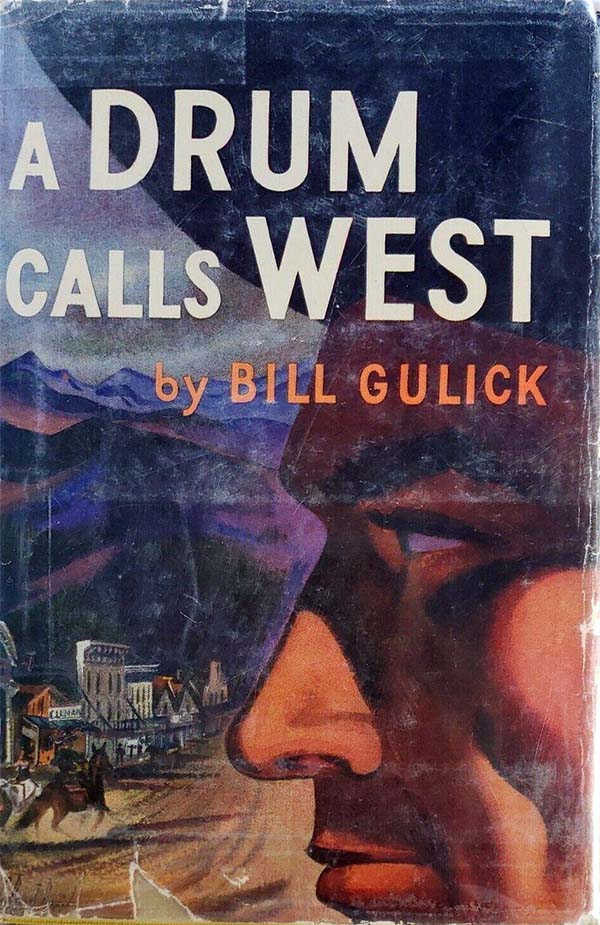
“Following my second book I spent two years writing my third book called A Thousand for the Caribou. It was based on the historical cattle drives from The Dalles, Ore., to the Caribou trail country on the Frazier river that supplied beef to the miners of the new gold-discovery country. The book went well and appeared in serial form in various Canadian newspapers, but was never made into a movie.
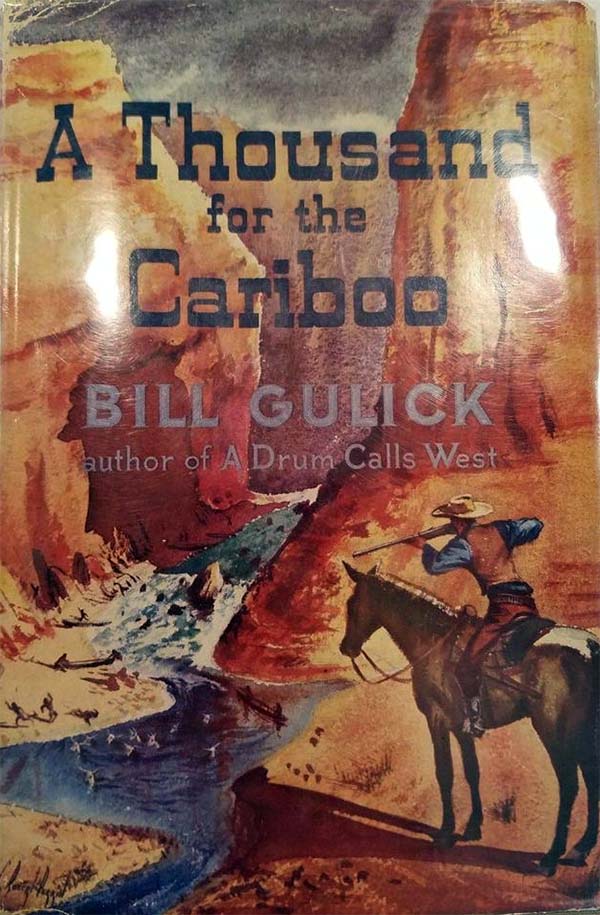
“About this time, 1955, my fourth book appeared, a collection of three novelettes and five short stories released under the title, White Men, Red Men, Mountain Men. I had been concentrating on western stories of the 1860-1870 period for some time and a near dozen western and Indian yarns had appeared in the Saturday Evening Post. The book of stories was some already published and some unpublished.
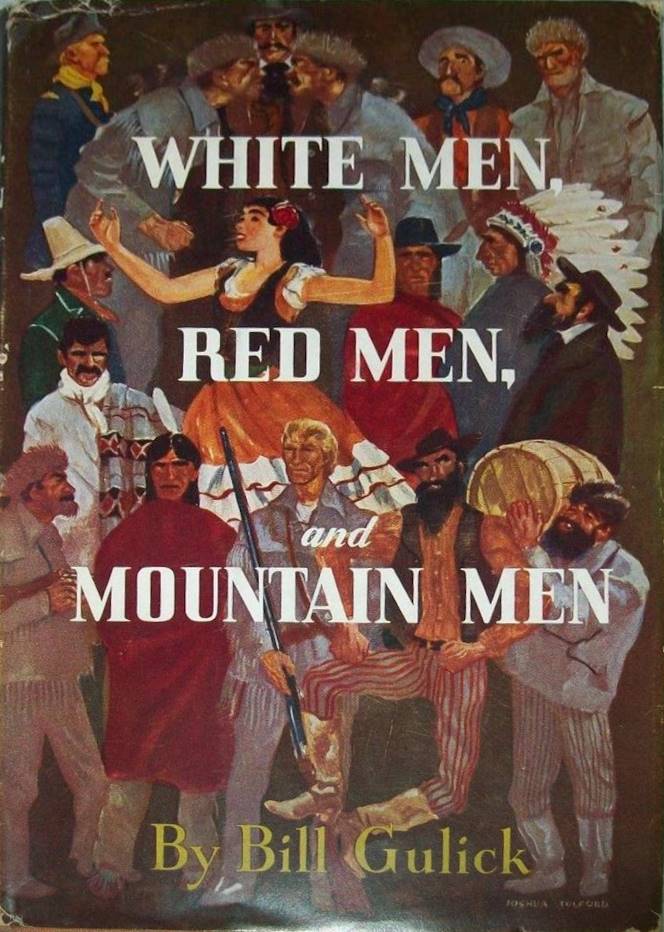
“In the writing of my three novels I had worked out my own continuity method, outlining the story completely with liberal inserts of dialogue before beginning the novel itself. Planning for my fifth book I had completed about a 10,000-word outline or brief synopsis which I had entitled, Showdown in the Sun I sent the outline to my Hollywood agent for his opinion. By luck the outline was readable enough that it appealed to representatives of Tyrone Powers’ independent movie company, Copa.
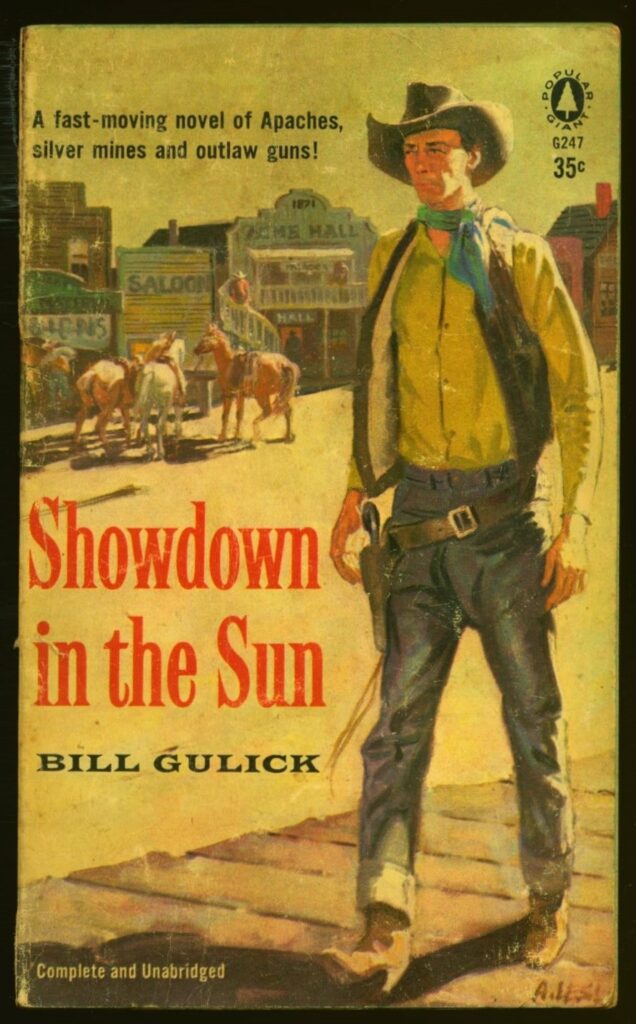
‘‘Powers was on the lookout for a western novel with two strong lead characters and Showdown in the Sun had that. The result was that the Powers’ company bought the movie rights from the outline before the book was published. I understand the movie itself will be released sometime this fall, with Tyrone Powers playing the lead. The book, Showdown in the Sun, is now on the newsstands in paperbound covers.”
IN 1955 while Gulick was still working on the Showdown in the Sun novel Walla Walla decided to put on a historical pageant commemorating the signing of the 1855 Indian treaty. Gulick was employed to write the continuity for the pageant. In doing so, he became well acquainted with various members of the Nez Perce Indian tribe and through that acquaintanceship had access to numerous old-time Indian legends. The Nez Perce tribe made him an honorary chief with the name of Me-Ohkart Sekan Hyh Hyh, which means Chief White Horse.
‘‘Working on the pageant script,” Gulick explained, “I became interested in some of the stories I heard of the expedition of Captain Bonneville of the United States army in his two exploration ventures on the Columbia and Snake rivers in the early 1830’s. The historical events of those years appealed to me as a wonderful background for a serious, historical novel. Using fictional characters, but carrying through the itinerary of Bonneville and historical local, I began working on the novel to be called The Land Beyond. It was my first try at a serious historical novel and while my agent tells me I am sort of sticking my neck out in departing from the ever popular type western themes, I got a lot of satisfaction out of writing this story.”
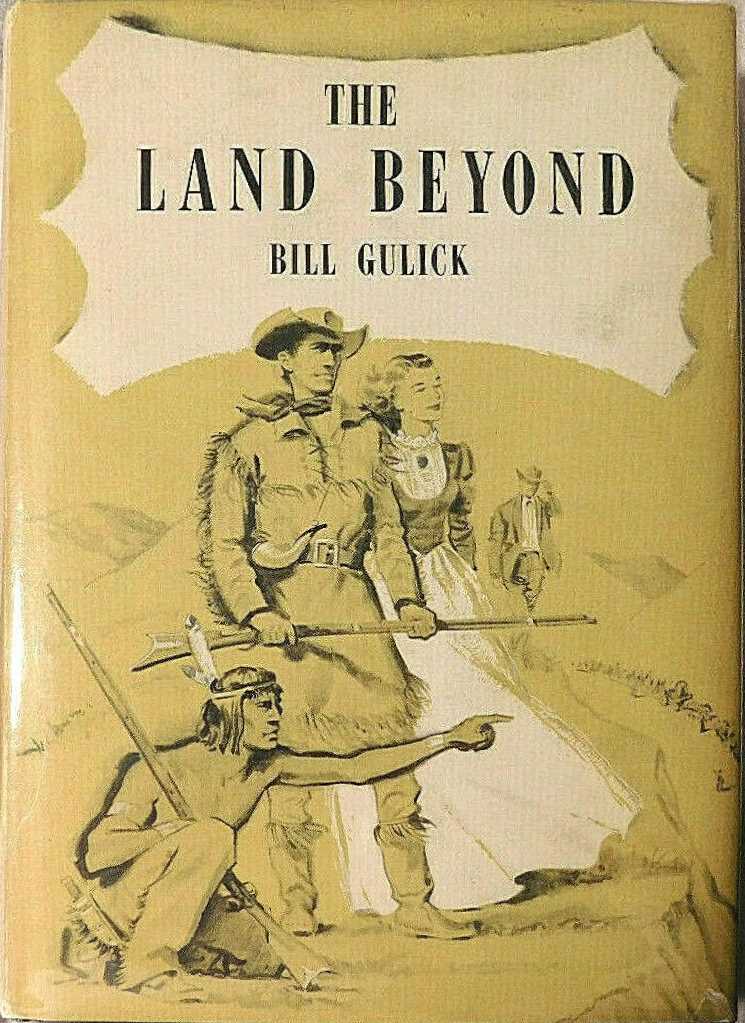
IT TOOK a little verbal sparring to get Gulick to answer a few personal questions, but finally we were successful. “I write quite slowly,” Gulick said, “usually spending 9 a. m. to 2 p. m. each day for five days a week at a typewriter and usually turning out about 1000 to 1500 words per session. I type my original copy, correct it in pencil, and then my wife types the final copy for editing. Of course, some short western stories seem to write themselves, and I have turned out a Saturday Evening Post westerner in a few days, but I have found out that slower writing means less revising and more acceptable copy.”
With mention of the typing, Jean, Bill Gulick’s attractive wife, beamed a broad smile. Mrs. Gulick is somewhat of an artist in her own field. She is a member of the Little Theater group in Walla Walla and has acted and directed in several of its productions.
“Is he hard to get along with when he is in the midst of one of his writing sessions?” Mrs. Gulick was asked. “He’s hard to get along with when he isn’t in a writing session,” Mrs. Gulick replied, still smiling. “I can tell his mood and how his story is going by the force he puts behind the typewriter keys. When those keys start pounding a little too hard,” she added, “I usually suggest a coffee break.” There was no contradiction from Bill Gulick.
“What advice do you have for ambitious writers or beginners?” Bill Gulick was asked. “Just keep writing,” Gulick replied with authority. “But don’t try to go to Hollywood or New York unless you have about a dozen byline stories in a first-rate magazine to your credit and about six months expense money in your pocket. Competition is tough in Hollywood. Every writer, professional or amateur, seems to finally gravitate either to New York or Hollywood. I guess writers are just like prospectors, everyone figures his next story may be the bonanza strike.”
my maiden name is Gulick and was raised around Springfield MO. I found the book Bend of the Snake and purchased it because of the name Gulick. I was always told if you ever meet another Gulick they are probably relatives. I have a geology of Gulicks published by a Gulick from California. I don’t know if Bill has any family but would be so interesting to visit